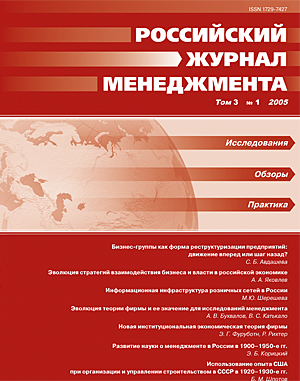Business Groups: Step Forward to or Backward from Market-Oriented Restructuring?
Abstract
The paper is focused on the impact of business groups on the restructuring and competitiveness of Russian privatized enterprises. The study is based on the results of surveys and interviews of top0managers of approximately 500 Russian industrial enterprises (medium-scale privatized enterprises in machinery building, light and food industries), which was conducted during the years 2002–2003. It is shown that industrial firms which are controlled by business groups as outside owners are oriented primarily at restructuring of internal organization and management, as opposed to improving of marketing at the enterprise level. The organization of business groups described in the article provides ambiguous impact on the competitiveness of business groups enterprises in the short and long-run.
Downloads
References
Downloads
Published
How to Cite
Issue
Section
License
Articles of the Russian Management Journal are open access distributed under the terms of the License Agreement with Saint Petersburg State University, which permits to the authors unrestricted distribution and self-archiving free of charge.





